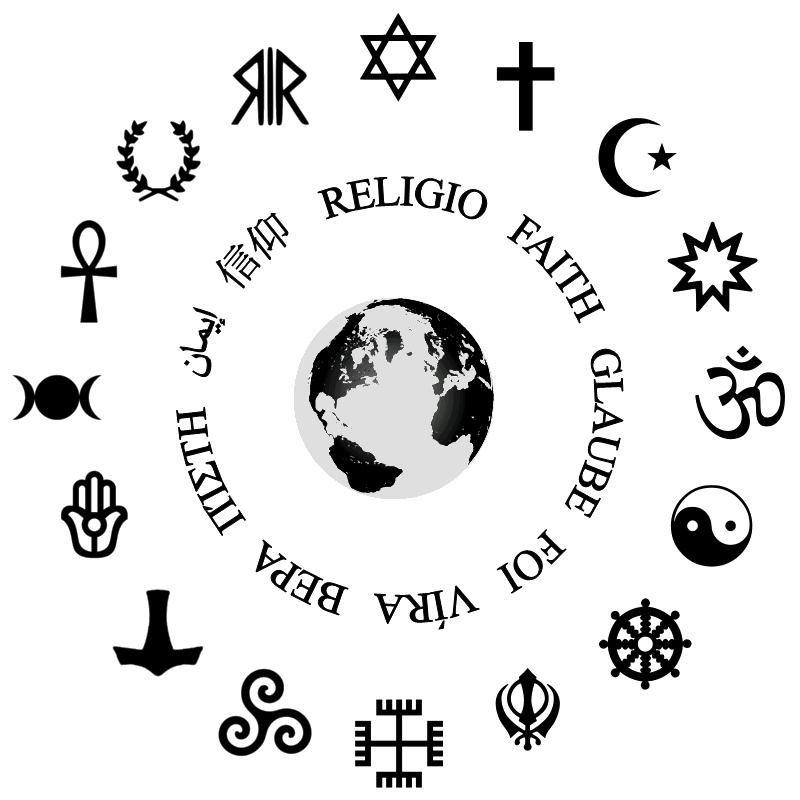This series looks at the Bible and what it’s useful for. It asks if the Bible and religion are valid and useful for today’s needs. It considers a philosophy of Christianity within religion. Since before the 1800s people have challenged both the Bible and religion. Many have rightly fled from the tyrannical aspects and fear mongering done in the name of religion, and many have left what has become useless to them.

https://commons.wikimedia.org/wiki/File:RELIGIONES.png
Much of the doubt comes simply from people neither understanding the Bible, religions, tradition getting in the way, and personal wants distorting religion.
Teachings on Scripture
“All Scripture is inspired by God and profitable for teaching, for reproof, for correction, for training in righteousness; so that the man of God may be adequate, equipped for every good work.” – 2 Timothy 3:16–17
We make a lot of assumptions in accepting translations. The Greek word γραφὴ is commonly translated scripture. It always refers to the Hebrew Scriptures (Old Testament). The actual meaning of the word is “writing.”
What does the verse mean by “inspired by God?” We actually don’t know for certain. Paul frequently invented new words in Greek as he did with this one: theopneustos. There is no historical reference for this word and its usage. The translation could be rendered more literally as “God breathed.” The breath of God is usually associated with bringing life into something. God breathes life into religious writing?
“God breathes life into religious writing” might be a more accurate way of thinking about it. When we look at it as something to study and consider, God breathes life into it for us. Jesus talks a lot about bringing life to people. (See Matthew 4:4 and John 4:10.)
People struggle with understanding the Bible because as both Jesus and Peter say. In John 5:39-40, people search the Scriptures for eternal “life,” but are unwilling to accept truths. In 2 Peter 3:16, people not only find the Bible difficult to understand, the “the untaught and unstable distort” them.
You can look in the Bible and justify revenge in “an eye for an eye” (Lev. 24:19–21). You can justify rejection by God and everyone in the purity standards established for worship – be clean as snow or you can’t worship God. You can justify isolating yourself in notions of sanctification and noting that the Jews felt it not “lawful” for them to associate with non-Jews (Acts 10:28). You can justify killing your children (Deuteronomy 21:18-22:30). You can justify just about every kind of bad behavior by looking in the Bible.
What does it all mean? None of the above can be justified in today’s world, and probably not in the ancient world either. These are examples that religion is not stationary, it evolves over time. For example, the world’s first Buddhist ruler, Emperor Ashoka, who ruled India from 274 to 232 BCE, was the first ruler in human history to ban slavery, the death penalty, animal cruelty, and deforestation. He advocated gender equality in education and religion. Yet it took the Western World until the 19th Century to do any of these and find any rationale in religion. Even ancient Sumer in 3000 BCE had some laws more advanced than Western 19th Century laws.
Jesus didn’t come to change all political and social systems. He came to give people a worldview and mindset so that they had a framework in which to accomplish these things. This is an incredibly important point that points to context. Religion isn’t a set of rigid, forever rules. It gives us a better framework for improving the world and our lives.
– Our answer is God, God’s answer is us. Together we make the world better. –
– Dorian Cole
In 21st Century religion we need to get beyond rigid thinking and understand true religion.
Context is everything
Politicians are especially bad at purposely quoting a small segment of something another said, while leaving out the rest that provides context for meaning. Advertisers sometimes do similar things.
“For example, the ad copy for New Line Cinema’s 1995 thriller Se7en … used the comment “a small masterpiece.” Gleiberman … only praised the opening credits so grandiosely: “The credit sequence, with its jumpy frames and near-subliminal flashes of psychoparaphernalia, is a small masterpiece of dementia.”” – Quoting Out Of Context on Wikipedia.
In this series, context is a major concern.
Takeaway
Wouldn’t it be nice if God came down to leave no doubt and tell us exactly what everything means? But this isn’t the way it works. We have to study hard and prove in our lives that the way God has shown us is right and other ways are wrong. We’re able to choose both.
Some people would be unlikely to believe God standing right in front of them, nor would they agree that God’s ways are best. If God didn’t agree with their preconceived notions then they would say that Satan was standing before them doing miracles and presenting information to fool them.
We have to be careful that we understand the context of the entire Bible and God and not be myopic in our views so that religion is what we want it to be instead of what it is.
Distorted perception is not reality. It’s the path to insanity.
Series Links
God has no needs that we can fulfill
The Prophets: God wants us to take care of others
________________________
The standard of belief and conduct for Christianity is love. Legal standard.
________________________
If you find these articles intriguing, please consider joining the mailing list.
If I’ve challenged your thinking, I’ve done my job.
___________________
Our answer is God. God’s answer is us. Together we make the world better.
– Dorian














